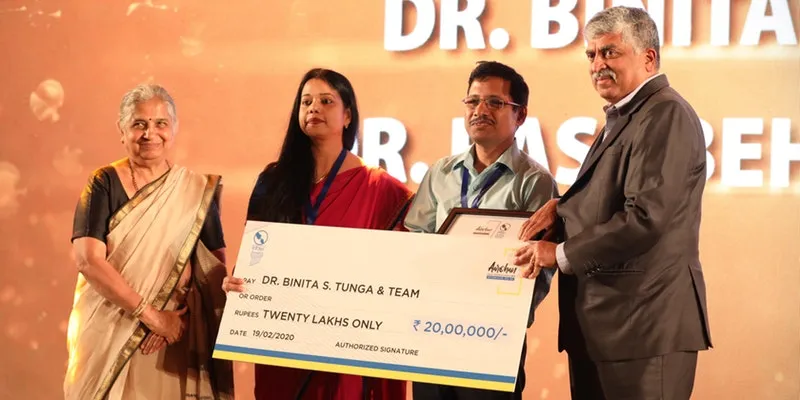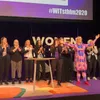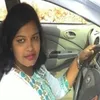This scientist couple’s innovation can diagnose mosquito-borne diseases in just 10 minutes
Founded by Dr Binita Tunga and her husband Dr Rashebari Tunga, Ameliorate Biotech addresses mosquito-borne diseases in remote areas with Assured, a diagnostic device that aims to help save people from dengue, malaria, and chikungunya.
Bill Gates believes that the mosquito is the deadliest insect in the world that “kills more people in one day than sharks kill over a hundred years.” The co-founder and philanthropist has been raising awareness on mosquito-borne diseases for many years now.
In rural India, many people suffer from mosquito-borne diseases like malaria, dengue, and chikungunya. However, the diagnosis can be made only once the the test results arrive from a hospital or a diagnostic lab in the city.
Chances are that the patient is tested for only one of the three diseases, say dengue. To check for malaria and chikungunya would not only mean an extended wait but also shelling out around Rs 5,000 extra.
Dr Binita Shrivastava Tunga, CTO and co-founder of Bengaluru-based healthcare startup says that such undetected coinfection results in inaccurate diagnosis, delayed treatment, and an increased economic burden on the patient.

Bengaluru-based doctors Binita S Tunga and Rashbehari Tunga won Rs 20 lakh in the gold category.
The resolve
Binita has been working on a possible alternative solution along with her husband and co-founder Dr Rashbehari Tunga since 2016. The duo has innovated a diagnostic device that can successfully detect malaria, dengue, and chikungunya in their early stages.
To be precise, the device can detect all three diseases within 10 minutes on the first day of exhibiting symptoms.
According to Binita, the device was developed, keeping the rural population and remote healthcare settings in mind. And hence, the aim was to make it both cost-effective and user-friendly.
“One does not need any specific equipment or trained technicians to use the device. We hope to enter the market soon and testing for all the three diseases will not cost more than a maximum of Rs 600 as opposed to the current price of around Rs 4,000 to 5,000,” she explains.
The co-founders were recently recognised by Infosys Foundation, the philanthropy arm of the IT giant. Their device, named Assured which is currently in clinical evaluation phase won Rs 20 lakh in gold category at the Aarohan Social Innovation Awards. Following this recognition, they say, their work is attracting interests from several investors.
The development is noteworthy in the light of current methods detecting mosquito-borne diseases are rapid diagnostic kits like Elisa and techniques like polymerase chain reaction (PCR).
“They need sophisticated instruments and lab facilities to be carried out,” Binita explains.
Beginnings and roadblocks
The need for solutions that can tackle mosquito-borne diseases became clear to Binita while at college when she lost her 11-year-old niece to dengue.
“Two more similar cases happened, where I lost my family members because early stage diagnosis did not happen,” she recalls.
Binita and Rashbehari both share that while their startup is now attracting interest, the journey has not been one without challenges, especially as innovators for healthcare and diagnosis solutions.
As with most healthcare and social entrepreneurs, the main difficulty is getting doctors and healthcare professionals show interest in their products and adopt.
“We tell them that a patient can be diagnosed early in one visit and more importantly, treatment can be started right away,” says Binita, adding that they are currently targeting healthcare centres, diagnostic and pathology labs and doctors more than the patients as users.
Woman in STEM
Binita recalls always being geared towards studies especially science and technology. She says her father topping the Indian School of Mines and her brother graduating from IIT, Bombay had rubbed off on her to want to study further, as much as she could.
Binita recalls an interest in STEM subjects right from childhood. She was also inspired by her father, a topper from the Indian School of Mines and her brother, a graduate from IIT-Bombay.
A PhD holder in Cell and Molecular Biology from IIT Kharagpur, Binita had to fight her way through suggestions of getting married and settling down when she had just completed her Bachelor’s degree.
However, she was determined to pursue research and started writing entrance exams without informing her family members. Binita says they eventually came around when she received an invitation from two Indian Institutes of Technology (IIT),” she says.
She started her first job in Hyderabad in 2004, and the professional world came with its own set of challenges. “Acceptability was less in terms of giving a higher position to women, even when I had graduated with PhD from a good institute.”
“The only way for a woman to sustain in this kind of environment is to be firm in her own decisions and work really hard to show that she is equally capable,” she adds.
Her mantra to life and learning has been to stay “hungry and foolish”. At the same time, Binita urges young and aspiring scientists to believe that what they do matters for science and society and to make sure that the intention is right in whatever they do.
(Edited by Rekha Balakrishnan)









